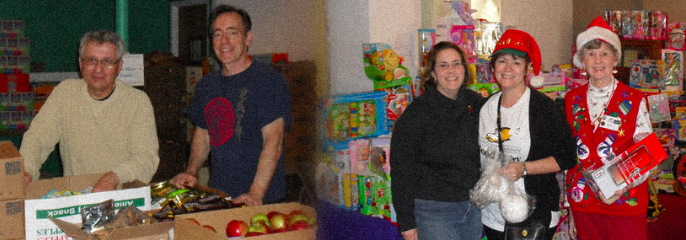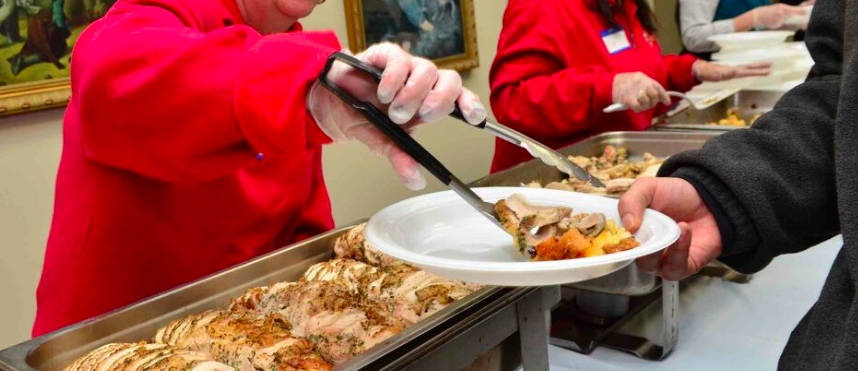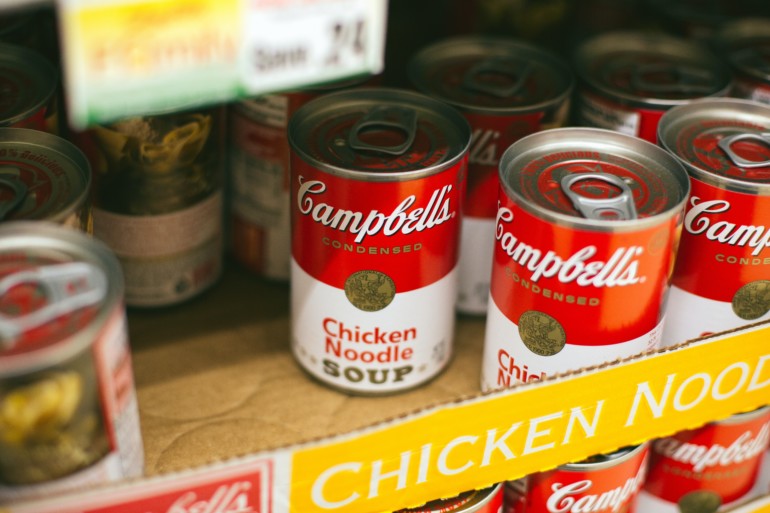With the holidays quickly approaching, there’s never a more important time to allow this season of giving to encourage just that — a commitment to supporting the people who need it most in Chicagoland. Among the most urgent needs is addressing food insecurity.
The lack of access to nutritious food is one part of a larger domino effect. Resorting to cheaper, less-healthy but more accessible foods can in the long run result in depression, diabetes and worse, leading to higher healthcare costs and shorter life expectancies.
To help, here is a list of 10 organizations across Chicago and the suburbs that are actively fighting hunger in our communities. Read on to see how you can help these local food pantries, food banks and more.
How To Help:
Greater Chicago Food Depository
Perhaps one of Chicago’s strongest, most widespread resources in the fight against hunger is the Greater Chicago Food Depository. Since 1979, their vital work as a food bank and support system for food insecurity has impacted nearly every part of the city. The organization distributes food and services across Cook County to various food pantries and other organizations in the business of feeding our community members. Additionally, GCFD serves as a resource bank for folks in need of help applying to food and medical benefits; resources for families; and a wealth of knowledge on navigating the often difficult process of securing food. Those looking to help can volunteer with GCFD or one of their partner organizations to do a range of tasks from packaging food to driving deliveries and more. The extensive list of opportunities, resources, and donation logistics can all be found on the Greater Chicago Food Depository website.
Connect Roasters
It is a fulfilling feeling when the goods you purchase come from an ethical source. That holds true with Connect Roasters — a coffee grounds company that is giving back to the Chicago community that has embraced them, with the help of Cubs player Ian Happ who joined CR founder Caleb Benoit during the pandemic. They began their mission to give back to the Greater Chicago Food Depository in May 2020. Since then, with the sales of two of their coffees: Ethiopian Guji or Congo Umoji, funds have gone directly to support GCFD — more specifically, for every pound of coffee sold, three meals are provided to the Depository via Connect Roasters. More information is available on the Connect Roasters website.
The Friendship Center Food Pantry
What began in the basement of a church has grown into a haven for many living with food insecurity, especially in Chicago’s Northwest neighborhoods. Serving anyone from families and individuals to pets, this Ravenswood-based food pantry does more than meet a basic need; it also encourages the well-being of all those it serves. Folks in need receive access to fresh fruits, vegetables, meat, dairy, and more four days a week — a constant that is necessary, especially in the wake of COVID. Yet, the work they do hinges on the continued support of volunteers and the routine donation of food, goods, and services. Looking for a more hands-on approach to this area of need in Chicago? Volunteers can sign up on the Center’s volunteer form. To make a monetary donation, visit the TFC donation page. But, before donating goods or in-kind services, review what is accepted by the organization — from non-perishables to pet food. More information can be located on The Friendship Center website.
A Safe Haven
A Safe Haven’s mission is to assist all those they serve to “aspire, transform and sustain” a new chapter in life as they “transition from homelessness to self-sufficiency with pride and purpose.” This extends to their food pantry services, which distributes food to around 200 families each week in the North Lawndale community. Aside from that, their services center on helping people build lives of dignity and success, with access to programs for housing, case management, education, job training, and much more. ASH is also a Make It Better Foundation Philanthropy Award winner, in thanks to the great work from former A Safe Haven Foundation President Neli Vazquez Rowland. Every day, our Chicagoland community members benefit from these long-standing services — be part of the reason it continues, through either monetary or in-kind donations. Get more information at A Safe Haven.
Nourishing Hope
Formerly known as the Lakeview Pantry, Nourishing Hope continues their years-long battle against food insecurity even in the COVID era. Their services run six days a week and restore dignity to those they serve by letting them lead the way as they gather food, ensuring they are getting both what they want and need, and not just what is available. Food can be secured in-person, ordering ahead online or even delivered on Saturday mornings. Coupled with their available social services, Nourishing Hope is doing critical work that can only be sustained through the generosity of the larger Chicago community. Whether donating monetarily or volunteering, your assistance can be one part of bringing nourishment to those who need it — 2.8 million pounds of food annually, to be exact. More information on how to help and where to locate services can be found on the Nourishing Hope website.
Pilsen Food Pantry
One element that distinguishes the Pilsen Food Pantry from others in the city is its commitment to offering culturally-appropriate foods in addition to the basics. Access to fresh foods and even seasonal clothes and supply drives are what make it such a stand-out resource in the Pilsen community. The Pilsen Food Pantry hinges on the physical, monetary, and community support it receives from Chicagoans looking to do good. Schedule a volunteer shift; look into the other services they offer, like the Pilsen Clothes Closet; or drop off food for the community to enjoy — no matter what, your efforts will assist the livelihood of others. Additional information on how to help and what donations they accept can be found on the Pilsen Food Pantry website.
Care For Real
Last year, through their locations in Edgewater and Rogers Park, Care For Real connected 10,000 individuals with the food they needed. Clients are welcome to come by the organization six days a week and new or visiting clients are assessed for what their dietary restrictions and requirements are so that they walk away with the food they need and deserve. Their “client-choice model” helps those who come to CFR meet their needs while also establishing dignity. Their Home Delivery Program is just another example of their mission to meet people where they are, this was especially crucial during the height of the COVID pandemic. “When neighbors are living in poverty, basic essentials … can be out of reach.” These resources — and CFR’s connection to fellow organizations in the city — could change someone’s life for the better. To join them in this mission, explore volunteer opportunities, and donate, learn more at Care For Real.
Irving Park Community Food Pantry

Living in a metropolitan area like Chicago, one can imagine the depth of need that surrounds us. Organizations like the Irving Park Community Food Pantry understand the variety of services necessary to holistically assist those in need, specifically with food insecurity. They encourage other companies or organizations to host a food drive or participate in their Special Distribution Days, which mostly revolve around the holidays. Their slogan, “Neighbors helping neighbors,” is certainly fitting as they are a community-first organization that invites everyone to help. Support their important work — collecting, organizing, and distributing food and goods — by donating or volunteering. Learn more at Irving Park Community Food Pantry.
Common Pantry
A few days a week, Common Pantry gives food to anyone in need in Cook County who meets its income guidelines. A variety of fresh foods, ready-to-eat meals, and, sometimes, baby formula are available for customers up to once a month. Additionally, they serve dinners for families during the holidays, truly keeping no one out of the celebration. Working toward a “strong community” is at the heart of all they do, and they ask Chicagoans to do the same. Even a $1 donation can provide four meals — imagine what a larger donation could do. All donation and volunteer information can be found on the Common Pantry website.
The Chicago Help Initiative

At its core, The Chicago Help Initiative harnesses the strength of dedicated volunteers to serve Chicagoans’ varied needs. From weekly hot dinners to bagged lunches, TCHI is covering a lot of ground with the resources they have. Want to offer help? The Initiative proudly welcomes volunteers to a number of opportunities that go beyond food distribution. Their additional services, like job resources or access to arts and culture, round out their holistic approach to fulfilling needs. Learn how to donate your time or money at The Chicago Help Initiative.
More from Better:
- 30 of the Best Things To Do in Chicago and the Suburbs in November 2022
- Where to Order Thanksgiving Dinner, Side Dishes, Pies and Desserts in Chicago and the North Shore
- 13 Most Powerful Philanthropists and Nonprofit Leaders Driving Change in Chicago and Beyond in 2022

Margaret Smith is a Chicago-based writer and editor with a passion for socio-political storytelling about their community. They are a graduate of Columbia College Chicago.

